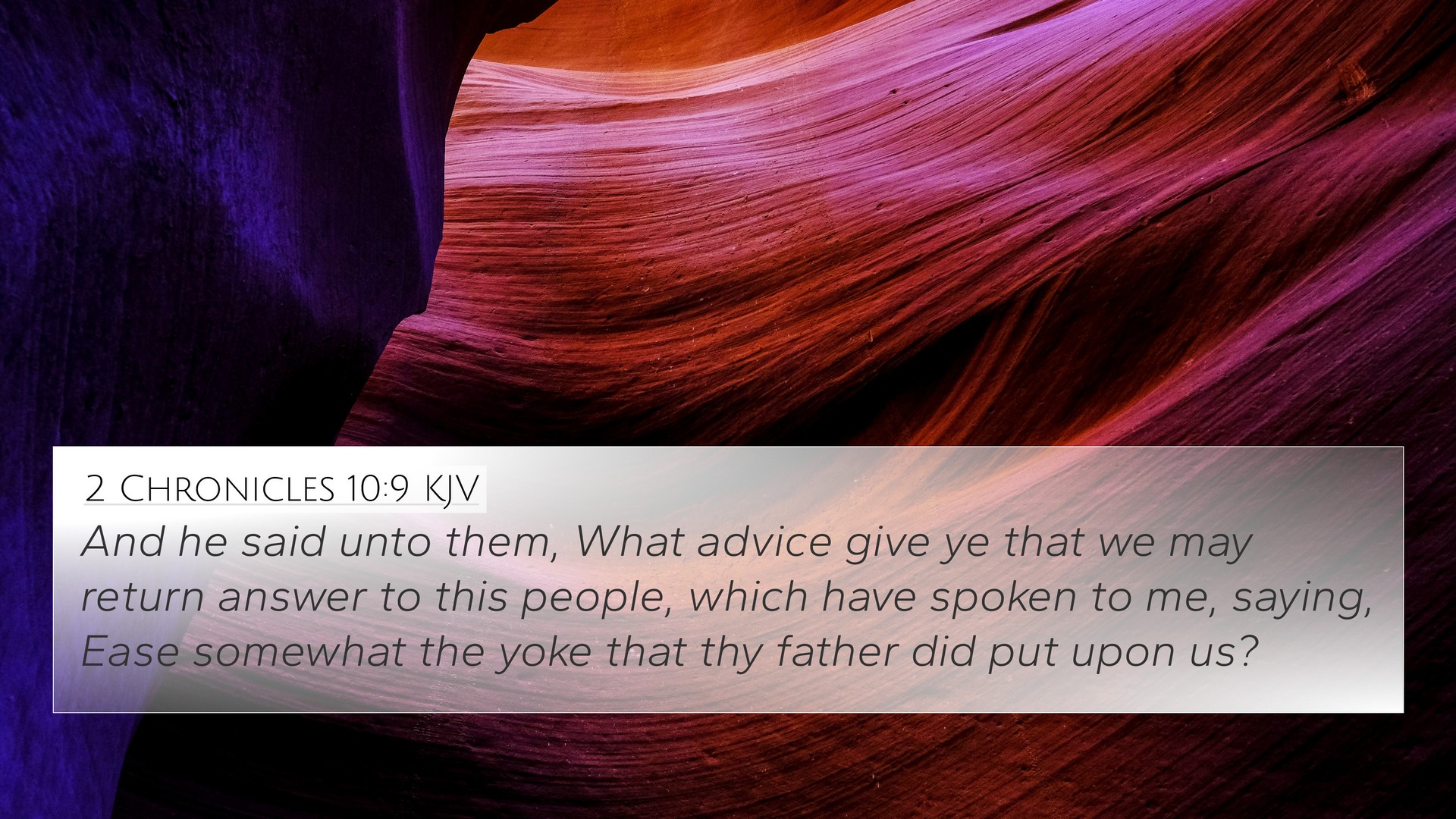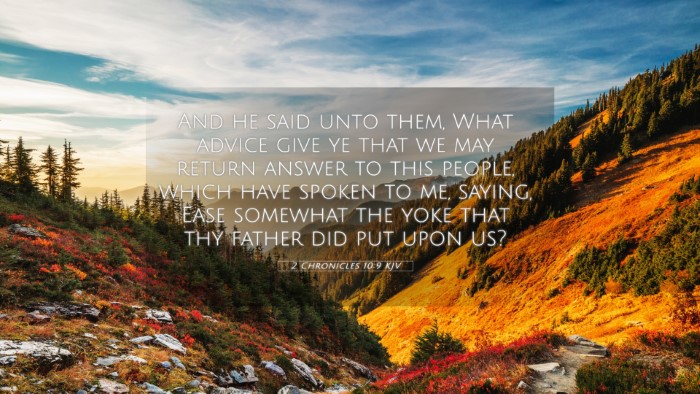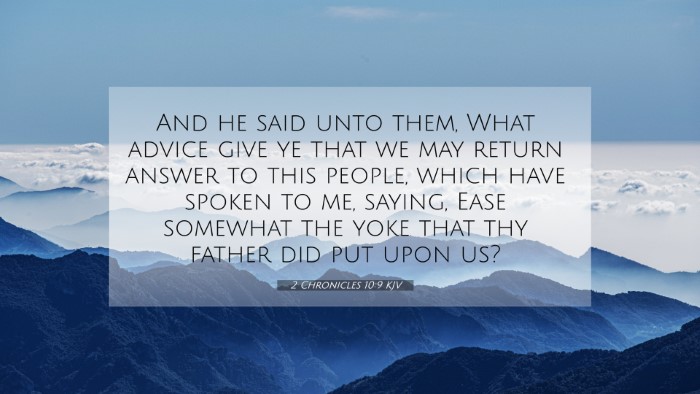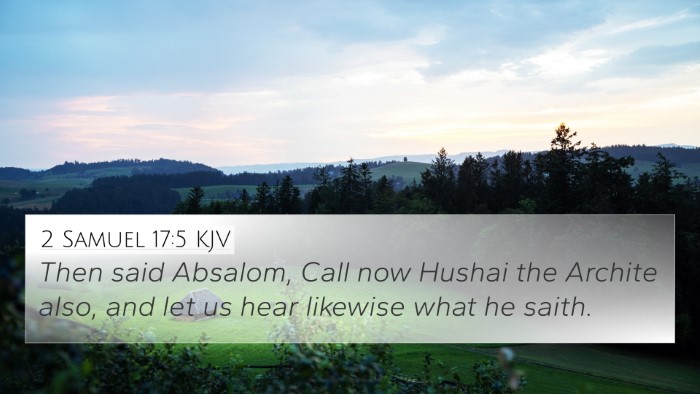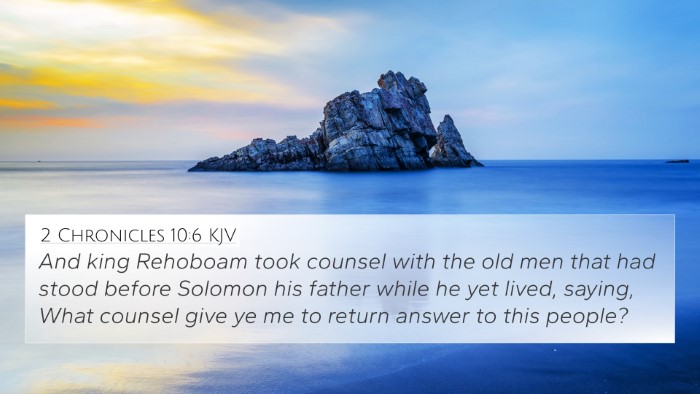Understanding 2 Chronicles 10:9
2 Chronicles 10:9 states: "And he said unto them, What advice give ye me to return answer to this people, which have spoken to me, saying, Make thou lighter the yoke that thy father did put upon us?" This verse captures a pivotal moment in the narrative of Rehoboam, the son of Solomon, as he faces the decision of how to respond to the people of Israel concerning the heavy burdens imposed by his father.
Summary of Insights
This verse highlights key themes such as leadership, governance, and the response to the people's demands. Rehoboam’s inquiry for advice reflects a moment of vulnerability and the responsibility that comes with leadership. Confronted with the people's request for relief, Rehoboam stands at a crossroads that will define his reign and the future of Israel.
Key Themes and Analysis
- Leadership and Responsibility: Rehoboam's question illustrates the burden of leadership and the importance of seeking wise counsel. Matthew Henry emphasizes that leaders should consider the needs of their subjects and be receptive to advice.
- The People's Voice: The request from the people shows their distress under Solomon's reign. This highlights the dynamics of authority and the role of the populace in governance, a recurring theme in biblical texts.
- Wisdom in Decision Making: Albert Barnes notes that Rehoboam’s initial inclination to consult with young advisers instead of seasoned individuals could lead to rash decisions, underscoring the necessity of wise counsel in leadership.
- The Consequences of Decisions: Adam Clarke speaks to the long-term impacts of decisions made in leadership, drawing attention to how Rehoboam's response would lead to a significant division in Israel.
Bible Verse Cross-References
Several Bible verses relate directly to themes found in 2 Chronicles 10:9. Below are cross-references that assist in understanding the broader biblical context:
- 1 Kings 12:1-15: This passage narrates the same event with additional details on the advice given to Rehoboam.
- Proverbs 11:14: "Where there is no counsel, the people fall: but in the multitude of counselors there is safety," emphasizing the importance of seeking wise counsel.
- Proverbs 15:22: "Without counsel purposes are disappointed: but in the multitude of counselors they are established," reinforcing the need for guidance.
- Exodus 18:21: Jethro advises Moses on governance, underlining the principle of wise leaders among the people.
- 2 Chronicles 10:8: Directly precedes our verse, detailing Rehoboam's choice to speak to the young men instead of the elders, setting the stage for his fateful decision.
- James 1:5: "If any of you lack wisdom, let him ask of God," indicating that divine wisdom is crucial for making important decisions.
- 1 Corinthians 10:11: "Now all these things happened unto them for ensamples: and they are written for our admonition," suggesting the importance of learning from biblical history.
Thematic Connections
The request made by the people in 2 Chronicles 10:9 can be explored thematically through various Biblical narratives:
- Leadership Lessons: The Bible often presents various leaders who faced similar challenges, providing examples of both wise and foolish decisions.
- Godly Wisdom vs. Human Counsel: Contrasts between seeking Godly wisdom and relying solely on human understanding are prominent in several narratives.
- Rebellion and Governance: Similar accounts throughout the Old Testament relate to the tension between rulers and their subjects, reflective of human nature and divine principles.
Conclusion
2 Chronicles 10:9 is more than a historical account; it is a lesson on the importance of wise counsel and the responsibilities of leadership. The verse invites reflection on the ways leaders can either uplift or burden those they govern.
